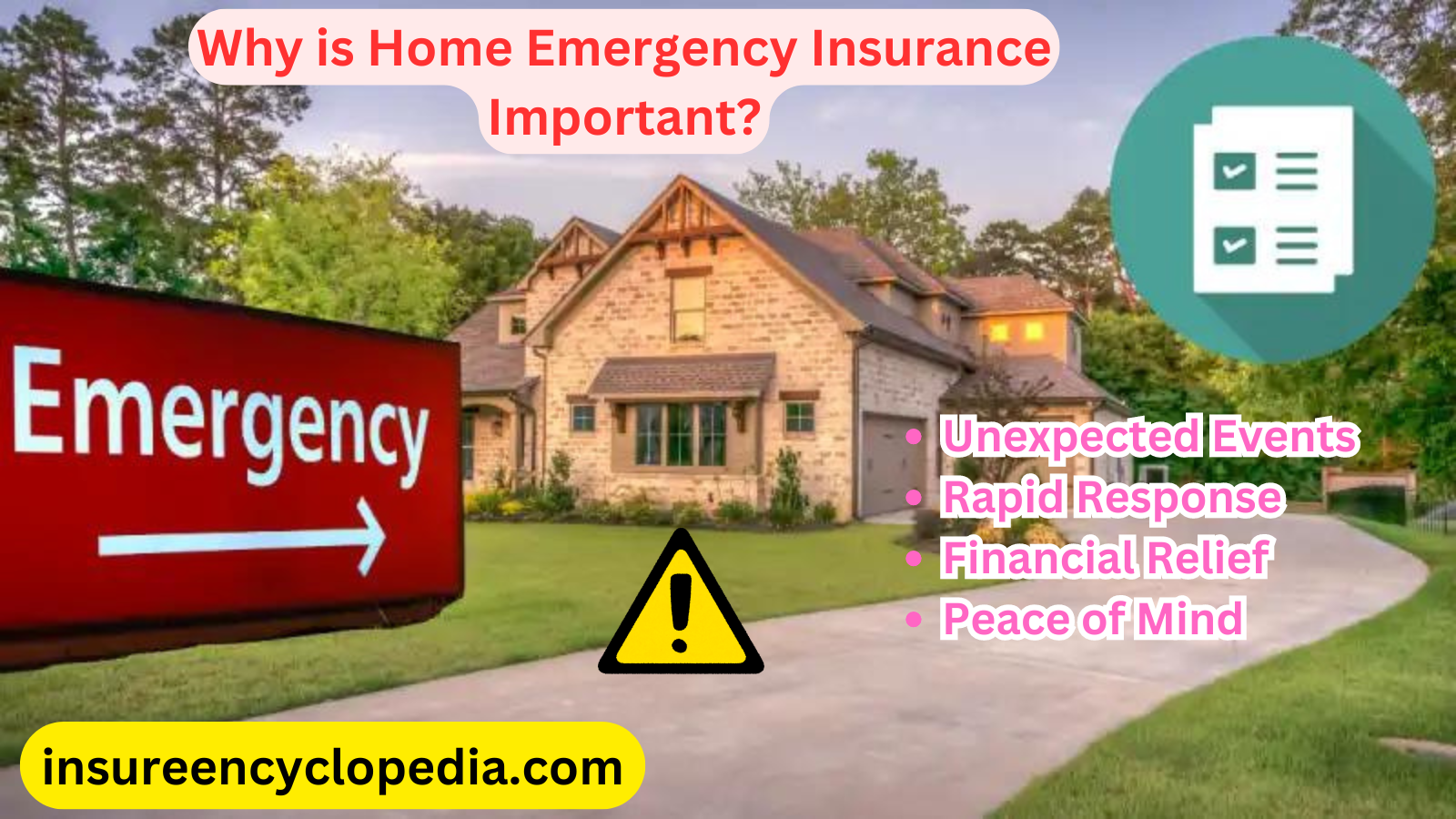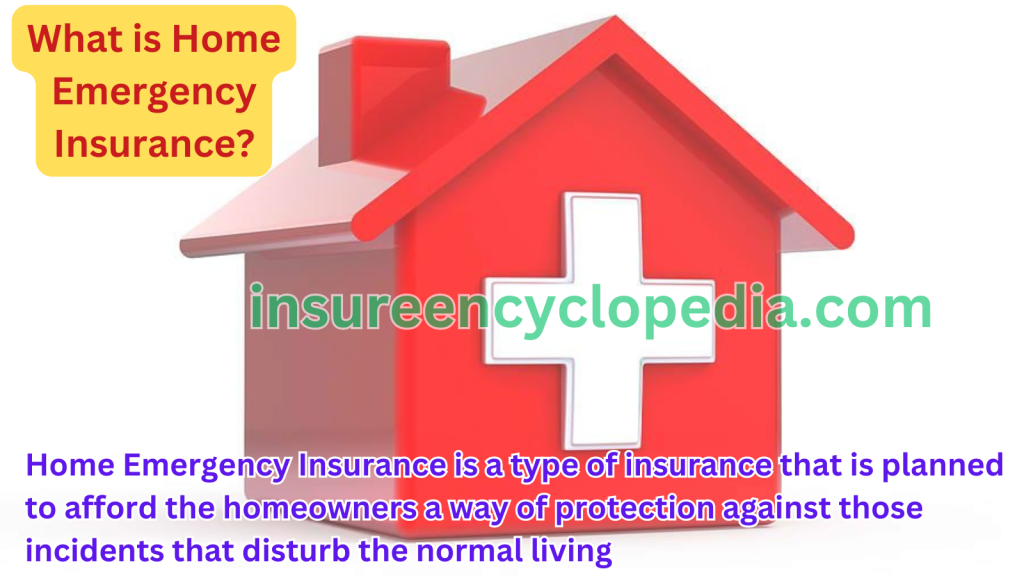What is Home Emergency Insurance?
Home Emergency Insurance is a type of insurance that is planned to afford the homeowners a way of protection against those incidents that disturb the normal living. Home emergency insurance is not the same as the regular homeowner’s insurance policy which is mostly designed to provide coverage for the house.

Why is Home Emergency Insurance Important?
- Unexpected Events: One can never know what might happen in life and it is always possible to have an emergency at any one time. Home emergency insurance provides a cushion that will assist you manage through these events without having to pay humongous amounts of money.
- Rapid Response: Getting to a safe place in a home emergency – sometimes, it’s as simple as the amount of time it takes to get dressed quickly. This is basically a guarantee that help will be available any time or at any time throughout the year when an emergency rises.
- Financial Relief: It also important to realize that emergencies are not cheap and can be very expensive. Some household emergency insurance will embrace costs that are repair costs, replacement costs and even costs that are associated with temporary accommodation hence proving crucial in the time of a disaster.
- Peace of Mind: It is good to know that you have home emergency insurance in the event of a crisis since it will help in curbing stress.
Kinds of Emergencies which are cared by Home Emergency Insurance:
- Plumbing emergencies: flooding, water accumulation, low temperature, ice and snow penetrating into the buildings, roof leaks, leaks from outside ventilation ducts
- Electrical failures: It was found that blackouts, short circuits and poor installation were the leading causes of electric shocks.
- Heating and cooling system breakdowns: Some of them include the failure of the furnace or when the air conditioner develops a problem.
- Roof damage: Leaking water, flood, branch of trees hitting houses
- Water damage: They are flood water, leakage water and any water penetrating the building.
- Pest infestations: The insects include ants, cockroaches, and beetles and so on while the other animals include mice, snakes, and rats and so on.
- Common Claims:
Emergency repairs: Emergency kind of man oeuvres that will help to prolong the durability or making the environment safe. - Temporary living expenses: Charges that you may be likely to warrant in order to make sure that you have a shelter you need for some time, most probably because your home is now unsuitable for human occupation.
- Replacement of damaged items: Regarded as the price of buying necessary equipment’s or items, home owners are always compelled to include the cost of replacing important household appliances or property.
- Emergency services: Others include paying for the professional such as the plumbers, electricians or any professional that the contractor may need.
Benefits of Home Emergency Insurance:
- Peace of mind: Emergency insurance can eliminate some stresses, the more so when you regularly remind yourself that you have it.
- Financial protection: Like home emergency insurance, they can be bought in order to cover for the cost of repair or replacement, which the homeowner cannot meet.
- Quick response: The majority of the policies offer emergency helpline services which ensure assistance is offered at any one time.
- Convenience: More to that the home emergency insurance can be so useful in managing emergencies and unplanned events.
- Potential savings: However, the premiums do not be high and home emergency insurance can also be an economical way of protecting your home as well as your money.
Choosing the Right Home Emergency Insurance:
- Coverage limits: It is also necessary to know in how much your insurer will compensate for each of the events protected and up to what amount.
- Deductibles: Find out how much money you will be required to pay out of your own pocket before insurance is going to begin kicking in.
- Exclusions: Thirdly, one should also have information as to what is not covered or which circumstance is not catered for under the insurance policy.
- Emergency assistance services: Think about the types of emergencies that are addressed such as the 24-hour service, emergency and the temporary housing services.
- Response times: What is the average time a company takes before responding to emergency calls?
- Customer reviews: The other thing that one needs to do is to read other customer reviews to know whether the insurer is good or bad in the market.
Comparing Policies:
- Coverage limits: Look at the various forms of emergency category as well as its limits obtained below:
- Deductibles: Decide as to which a deductible is more economical for your pocket and how much risk you can afford to bear.
- Premiums: If price is an issue, then attempt to estimate how much it would cost for you to pay for the said policy from various insurance companies.
- Exclusions: Two, whether certain exclusions differ from one policy to the other in terms of degree of exclusion.
- Customer service: In this case it is useful to focus on those aspects that touch on the policyholder response or the insurer’s response.
Cost vs. Coverage:
In particular, if focused on home emergency insurance, there is a need to abide by the principles of proper insurance and cost-efficient insurance. That is; low premium can mean low limits of insurance or no benefits at all but the high premium can mean better limit of insurance. You should also indicate your financial capability, and your ability to undertake risk to enable you to determine your coverage level. If the risk level of your house and its environment to experience emergency cases such a flood is high the age of the house is also high you may decide to opt for better policy.
However, it will also be important to state that the process of selecting the best home emergency insurance policy will also not be the same thing because it will depend on so many things. As has be seen from the various points discussed above and comparing the different available choices, you can be able to get in a position that makes you select the most appropriate policy that suits and is available at the most reasonable rate possible.
Get more Information about Insurance:


